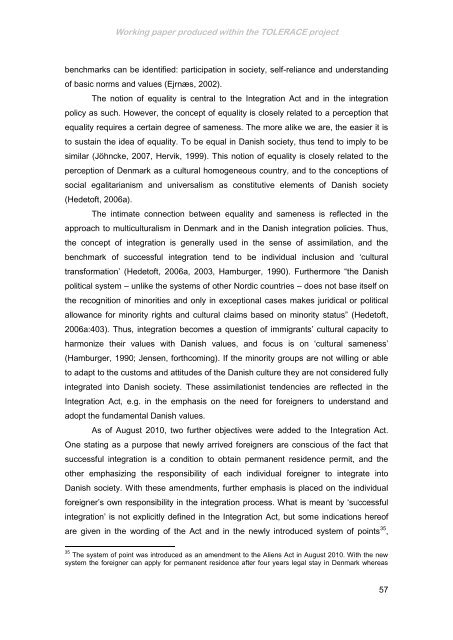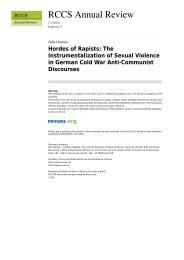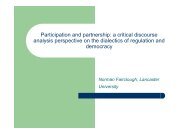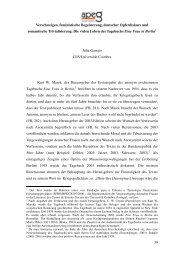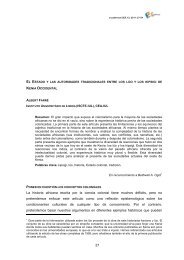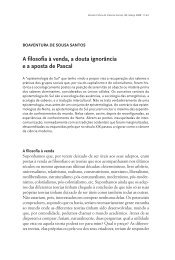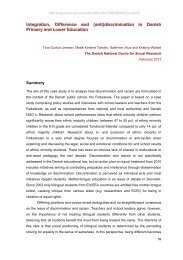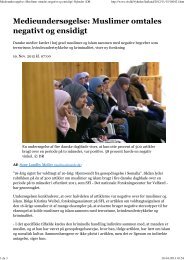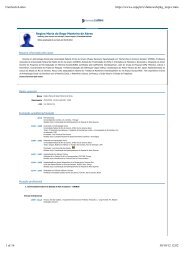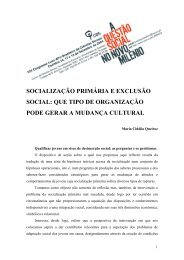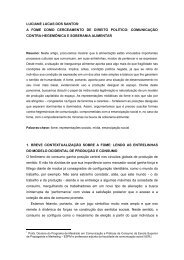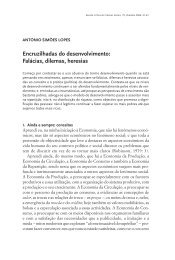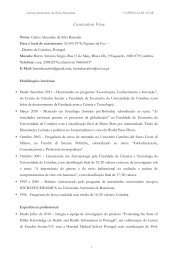Analysis of Integration Policies and Public State-Endorsed ...
Analysis of Integration Policies and Public State-Endorsed ...
Analysis of Integration Policies and Public State-Endorsed ...
Create successful ePaper yourself
Turn your PDF publications into a flip-book with our unique Google optimized e-Paper software.
Working paper produced within the TOLERACE project<br />
benchmarks can be identified: participation in society, self-reliance <strong>and</strong> underst<strong>and</strong>ing<br />
<strong>of</strong> basic norms <strong>and</strong> values (Ejrnæs, 2002).<br />
The notion <strong>of</strong> equality is central to the <strong>Integration</strong> Act <strong>and</strong> in the integration<br />
policy as such. However, the concept <strong>of</strong> equality is closely related to a perception that<br />
equality requires a certain degree <strong>of</strong> sameness. The more alike we are, the easier it is<br />
to sustain the idea <strong>of</strong> equality. To be equal in Danish society, thus tend to imply to be<br />
similar (Jöhncke, 2007, Hervik, 1999). This notion <strong>of</strong> equality is closely related to the<br />
perception <strong>of</strong> Denmark as a cultural homogeneous country, <strong>and</strong> to the conceptions <strong>of</strong><br />
social egalitarianism <strong>and</strong> universalism as constitutive elements <strong>of</strong> Danish society<br />
(Hedet<strong>of</strong>t, 2006a).<br />
The intimate connection between equality <strong>and</strong> sameness is reflected in the<br />
approach to multiculturalism in Denmark <strong>and</strong> in the Danish integration policies. Thus,<br />
the concept <strong>of</strong> integration is generally used in the sense <strong>of</strong> assimilation, <strong>and</strong> the<br />
benchmark <strong>of</strong> successful integration tend to be individual inclusion <strong>and</strong> ‗cultural<br />
transformation‘ (Hedet<strong>of</strong>t, 2006a, 2003, Hamburger, 1990). Furthermore ―the Danish<br />
political system – unlike the systems <strong>of</strong> other Nordic countries – does not base itself on<br />
the recognition <strong>of</strong> minorities <strong>and</strong> only in exceptional cases makes juridical or political<br />
allowance for minority rights <strong>and</strong> cultural claims based on minority status‖ (Hedet<strong>of</strong>t,<br />
2006a:403). Thus, integration becomes a question <strong>of</strong> immigrants‘ cultural capacity to<br />
harmonize their values with Danish values, <strong>and</strong> focus is on ‗cultural sameness‘<br />
(Hamburger, 1990; Jensen, forthcoming). If the minority groups are not willing or able<br />
to adapt to the customs <strong>and</strong> attitudes <strong>of</strong> the Danish culture they are not considered fully<br />
integrated into Danish society. These assimilationist tendencies are reflected in the<br />
<strong>Integration</strong> Act, e.g. in the emphasis on the need for foreigners to underst<strong>and</strong> <strong>and</strong><br />
adopt the fundamental Danish values.<br />
As <strong>of</strong> August 2010, two further objectives were added to the <strong>Integration</strong> Act.<br />
One stating as a purpose that newly arrived foreigners are conscious <strong>of</strong> the fact that<br />
successful integration is a condition to obtain permanent residence permit, <strong>and</strong> the<br />
other emphasizing the responsibility <strong>of</strong> each individual foreigner to integrate into<br />
Danish society. With these amendments, further emphasis is placed on the individual<br />
foreigner‘s own responsibility in the integration process. What is meant by ‗successful<br />
integration‘ is not explicitly defined in the <strong>Integration</strong> Act, but some indications here<strong>of</strong><br />
are given in the wording <strong>of</strong> the Act <strong>and</strong> in the newly introduced system <strong>of</strong> points 35 ,<br />
35 The system <strong>of</strong> point was introduced as an amendment to the Aliens Act in August 2010. With the new<br />
system the foreigner can apply for permanent residence after four years legal stay in Denmark whereas<br />
57


